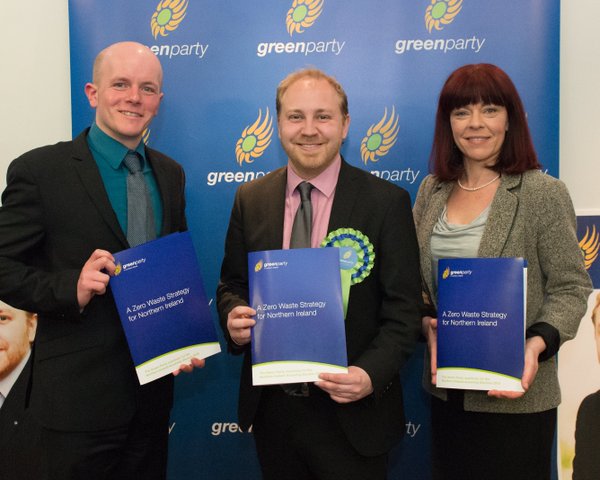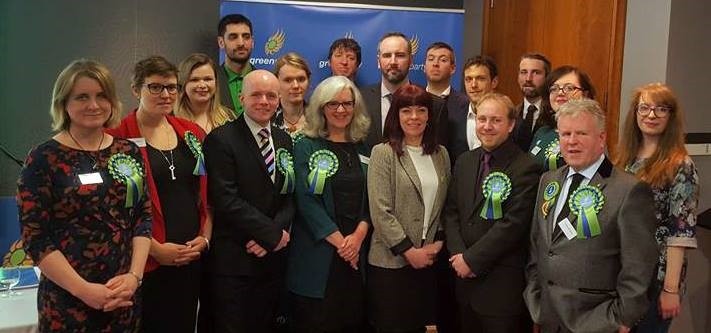Who will the new Green MLAs be?

It’s only one week to go until the Northern Ireland Assembly elections and the Green Party in Northern Ireland are feeling confident about their proposals for equal marriage, free school meals for young children, and political transparency. Leader Steven Agnew announced publicly that he would be disappointed if the party did not win at least three seats on May 5th.
Four Green candidates for the Assembly were speaking at the launch of that Manifesto; Agnew himself, Deputy Leader Clare Bailey, Councillor Ross Brown, and party Chair John Hardy.
The first three of these hold the most likelihood of any Green candidates in being elected next week. But who are they, what are their political histories and specialities?
Steven Agnew, elected to represent North Down as NI’s only Green MLA in 2011, has gained praise from across the political spectrum for his work as a principled and hardworking politician, holding the Executive to account over welfare reform, and introducing the Assembly’s first motion on equal marriage, along with the introduction of his successful Children’s Bill, making government departments work together for children’s services.
Steven joined the Green Party in 2003, after meeting Prof. John Barry on an anti-Iraq War protest march. Previously working with a homelessness charity and as a parliamentary researcher, he became party leader in 2011 after gaining the NI Greens’ highest ever European result in 2009.
Clare Bailey, a well-known women’s rights campaigner and Deputy Leader of the party, is fighting for a seat in South Belfast, where she gained the Greens’ best result in 2015. A volunteer escort at the Marie Stopes Clinic in Belfast, Clare is best known for her social justice activism, standing up for the rights of women and LGBTQ people in Northern Ireland, where, unlike the rest of the UK, women have no right to choose, and same-sex couples have no right to marry.
A founder pupil of the integrated Lagan College in Belfast, Clare is a supporter of integrated education, and has worked with local residents in her area to campaign for better housing. She became the Green Party’s first Deputy Leader in 2014, having joined the party, in part, because of its open and participative internal processes.
Ross Brown, Belfast’s only Green Councillor, is campaigning for a seat in his home constituency of East Belfast, where he was first elected to Council in 2014. A hardworking and effective councillor, Ross has secured commitments from Belfast City Council on political transparency, the creation of an animal cruelty register, and has challenged the oil drilling at Woodburn Forest in Carrickfergus.
Ross trained as an economist at Queen’s University Belfast, the experience of which converted him from a conservative DUP supporter to a radical Green, as he was exposed to new political and world-views, being taught by the “godfather” of GPNI, Prof. John Barry. With experience working both in the Treasury and in Stormont, Ross’ speciality is green economics, with a focus on issues like homelessness, fuel poverty, child poverty, and inequality.
With active volunteers and effective campaigns behind them, there’s a good chance these three will be making waves over the next 5 years in the Assembly.
Also worth watching are Tanya Jones (Fermanagh & South Tyrone) and Ciaran McClean (West Tyrone), 2015’s most westerly Green candidates, known for their activism in the frack-free movement, and in opposing gold-mining in the Sperrins, respectively. Ellen Murray is flying the Green flag in West Belfast as Ireland’ first openly transgender candidate, and are joined as representatives of the Queer Greens by Malachai O’Hara (North Belfast), Georgia Grainger (Strangford), and Mary Hassan (Foyle). On a good day, all of these candidates could yield impressive results, as capable and inspiring Greens could do across Northern Ireland.
While it’s unlikely for Greens outside the 3 target areas to gain seats, our movement will be amazingly represented by a group of Green MLAs in the form of Steven, Clare, and Ross. This gain in representation would mark a massive shift in Northern Irish politics, as the Green Party continues to show itself as a voice for the marginalised and oppressed, and a force of change, keeping the Executive in Stormont to account and providing a much-needed anti-sectarian, truly progressive activism.
You can read GPNI’s Zero Waste manifesto, along with the Queer Greens’ and Young Greens’ manifestos, online here.


Leave a Reply